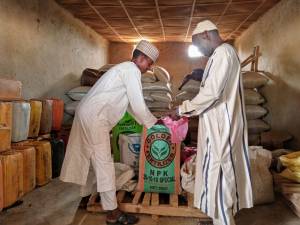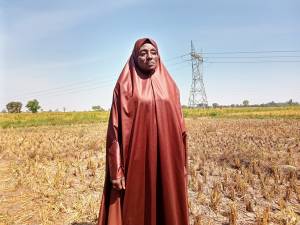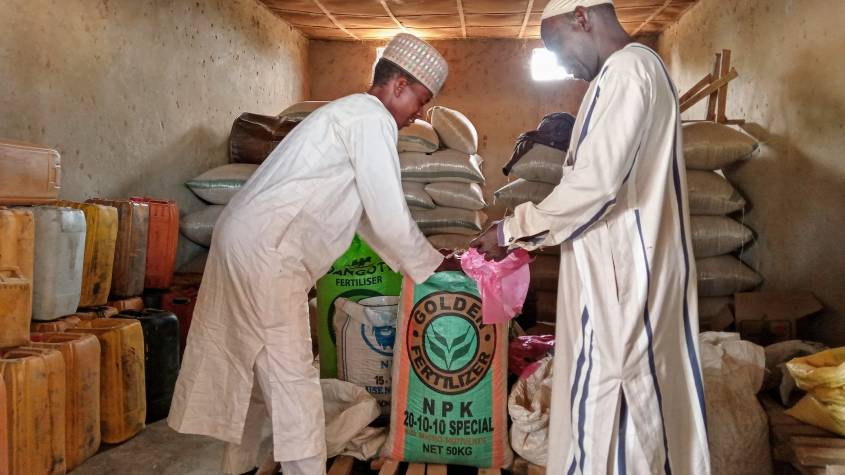SAA-KSADP: Towards sustainable development of crop value chains in Kano
Thanks to Sasakawa’s partnership with the Kano State Government through the Kano State Agro-Pastoral Development Project (KSADP), farmers across the state are benefitting from various forms of transformative interventions across the entire value-chains of selected crops, from production and agro-processing to value addition through marketing

Forty-year-old Muktar Garba is a smallholder farmer cum grains trader in Token community of Warawa Local Government Area (LGA) of Kano state, northwestern Nigeria. Other than grains, Garba also vends other farm inputs out of his shop on the major alleyway of his community; but he has not always been a shopkeeper as this is only a new addition to his main source of livelihood i.e farming.
Garba’s new vocation is due to his plentiful harvest this year, courtesy of the nonprofit Sasakawa Africa Association (SAA) and the Kano State Agro-Pastoral Development Project (KSADP). Although he has been associated with farming since his childhood it only became his main occupation around 2008. However, this smallholder farmer is a man with huge responsibilities; aside from his two wives and five children he also caters for members of his extended family.
Shouldering this enormous responsibility has never been easy for Garba due to declining harvests from his one-hectare farmland. He had always believed his harvests were not commensurate with the size of his farmland, despite his best efforts! Other than his farmland’s obvious barrenness he had continuously grappled with pests and poor quality seeds. What Garba now realizes is that he was also deficient in modern technologies and know-how to maximize yield on his farmland.
“I have been a farmer for the past 13 years and this year, I was a beneficiary of a capacity building training by Sasakawa where I was trained on how to boost the productivity of my crops and also enhance the profit I was making from the sale of my produce. After the training I also got farm inputs from Sasakawa which included NPK fertilizer, Urea, and pesticide – all free of charge! The coming of SAA-KSADP has completely turned around things in my life,” narrates the smallholder farmer.
Garba said he was initially suspicious of Sasakawa as he could not believe anyone would train farmers and also offer them farm inputs free of charge – without expecting anything in return. He later realized that truly Sasakawa was only after the enhancement of the productivity of his crops adding that thanks to their intervention through KSADP, he was able to realize a record-breaking harvest this year.
“Every year I would invest between ₦500,000 and ₦600,000 on my 1 hectare farm and harvest close to 57 bags of rice. Thanks to Sasakawa’s intervention, this year I invested less than ₦400,000 and harvested 102 bags of rice from the same field. I took a portion of the produce home for my family’s consumption, sold some bags in the market at ₦15,000 per bag, and used part of the money to rent this shop where I now sell grains and fertilizers to other farmers,” Garba relates.
Another beneficiary of SAA-KSADP’s improved farming techniques, Iliya Garba, a smallholder maize farmer in Dakasoye community of Garun Mallam LGA was initially in a quandary about using the improved maize seedling given to him by Sasakawa’s extension agent with the instruction to plant one seed – against the two seeds he normally plants. He later decided to give it a shot even as doing so seemed strange to him, a move that he said transformed his harvests.
“I decided to use the new but strange seed and the Sasakawa planting technique. I applied the free fertilizer and insecticide given to me by them. Weeks after planting the strange maize seeds, as guided by the Sasakawa extension agent, my maize began to flourish even as I used just two bags of fertilizer – against the five bags I usually apply on my farmland. I previously used to harvest about 20 bags of maize but this year I got an additional 11 bags,” a visibly happy Iliya stated.
Muhammad Suleiman, a SAA-KSADP-trained extension agent in Gwarzo LGA says more than 25,000 farmers had benefited directly while additional 50,000 farmers had benefited indirectly from the KSADP intervention in Gwarzo. “Before the intervention many farmers had abandoned their farmlands due to poor yield and lack of advice from extension agents and also farm inputs to boost their yield. After the SAA-KSADP training, and farm inputs were freely given to the farmers they began to witness improved yield.”

Unpacking the Agro-Pastoral Development Project
Muktar and Iliya were speaking to African Newspage during the maiden media field days organized by SAA-KSADP to showcase the impact of KSADP on the lives of smallholder farmers across Kano State. The field days afforded journalists the opportunity to acquire first-hand information from beneficiaries of the Project across KSADP’s three thematic areas, namely; crop productivity enhancement; postharvest and agro-processing; as well as public-private partnership and market access.
Thanks to KSADP hundreds of thousands of smallholder farmers like Muktar and Iliya are now financially stable enough to cater for the needs of their families. Their success stories are courtesy of SAA’s partnership with the Kano State Government through the $21-million-worth, five-year KSADP project which supports agricultural producers, processors and market operators through the promotion of new agricultural technologies to increase productivity and incomes across Kano state.
The Project seeks to reduce poverty, food insecurity and natural resource degradation, in accordance with the goals and targets of the Sustainable Development Goals (SDGs), the Kano State Development Plan II 2016-2025 (KSDP II) as well as the Federal Government of Nigeria‘s Economic Recovery and Growth Plan (ERGP) 2017-2020 and Agriculture Promotion Policy 2016-2020.
KSADP, which is being implemented courtesy of a loan facility from the Islamic Development Bank (IsDB) and a grant component from the Live and Livelihood Fund (LLF), aims to contribute to poverty reduction and strengthening food and nutrition security among the vulnerable population of Kano state through sustainable development of livestock and selected crop value chains.
Moreover, KSADP supports the state and federal governments’ efforts towards enhancing agricultural productivity and competitiveness through access to inputs and credit, value addition and market access, extension services delivery and capacity strengthening. This is in addition to incorporating relevant crosscutting issues such as private sector involvement, climate-smart agriculture, gender mainstreaming and human nutrition.

Mainstreaming gender in KSADP
Gender mainstreaming is a key component of SAA’s new five-year strategic plan (2021 – 2025) which seeks to help African farmers fulfil their aspiration of producing nutritious food to feed the continent’s ever expanding population, against the backdrop of declining food production, unpredictable weather patterns and now the COVID-19 pandemic. Consequently, capacity building for women farmers is central to Sasakawa’s efforts to address women’s marginalization across agricultural value chains.
To this end, Sasakawa has through KSADP already empowered 45 different groups of women rice processors with its capacity building training for farmers leading to significant impact on the harvests of the women farmers. To further empower the women farmers, SAA-KSADP is networking women farmers across Kano and supporting the establishment of 6 small-scale rice mills across the state. This is in a bid to ensure women’s inclusion across the entire value chain of production, processing, value addition, and marketing.
Rabi Liman, a 50-year-old rice farmer in Garun Mallam LGA is one of the women rice processors beneficiaries of SAA-KSADP. Thanks to the advanced farming techniques she acquired her yield had improved significantly and the profits from her value-added rice means the mother of nine can now easily sponsor the education of all her children, five of whom are currently studying at various higher institutions of learning. Unlike before, her family no longer has to worry about the payment of tuition fees.
“Before now my farming activities were unplanned and devoid of any organisation or record keeping. As a result of Sasakawa’s intervention, I was introduced to improved technologies of farming and improved seeds which has led to substantial yield for me. My cluster is made up of 25 women rice farmers, we were taught how to process our rice and add value to it. Until now, all we could make from the rice were local delicacies such as Tuwon Shinkafa and Wainar Shinkafa,” explains Liman.
“We can now produce rice cake and rice buns among other snacks from the rice we harvest from our farms. After acquiring these new skills, we decided to conduct step down training for fellow women rice farmers from other clusters who did not benefit from the training so they can also add value to their produce. This will also help them generate additional incomes for their families and become self-reliant just as we are in my cluster. With this new development, we now participate in both the business and farming aspects of agriculture.”
Relatedly, Bilkisu Yahaya, leader of the women farmers at Tsohon Garu community of Gwarzo LGA, says the SAA-KSADP intervention has within a short time changed the financial status of women farmers in her locality who now produce stone-free rice and make more profits. “We learnt enhanced methods of rice processing and packaging and got parboiling pots, sealing machines, weighing scales, among other equipment. Our local parboiling pot could only boil 10-20 bowls of rice while the SAA-KSADP pot can boil up to 2 bags of rice at a go, saving us both time and money.”
Ms Yahaya, a mother of seven, said before now they were selling a bowl of their parboiled rice for ₦ 1,000 but with the value addition brought to them courtesy of SAA-KSADP; now sell a 1kg pack of their improved rice goes for between ₦1,200 and ₦1,300. Their customer base has also increased significantly because their rice is now cleaner and well-packaged. “My family no longer lacks. I thank Sasakawa and KSADP for this initiative. We made zero payment to Sasakawa – all that we received was free of charge!” she said.
Like Ms Yahaya, Talatu Idi, a rice farmer in Bunkure LGA believes KSADP had transformed the lives of women in her locality, thanks to profits from their value-added rice. “We were initially stiff-necked about this new technology, yet Sasakawa persisted until we couldn’t resist anymore. Other than the free rice parboiling equipment given to us, they linked us up with markets to sell our products at good prices. Before, the highest level of education our children could attain was secondary school. Now I can confidently say we can sponsor our children up to university level.”
The Sasakawa- Kano partnership
While speaking during a courtesy call on the managing director of the Kano State Agricultural and Rural Development Authority (KNARDA) at the inception of the media field days, Dr Abdulhamid Gambo, deputy country director of SAA in Nigeria said most of their agricultural technologies had been adopted by states across Nigeria adding that Sasakawa’s major successes in enabling food, nutrition, and income security in rural communities of Kano state was to a large extent thanks to the consistent support it enjoyed from KNARDA.
In his response, Dr Junaidu Muhammad, managing director of KNARDA said the partnership between SAA and KNARDA had improved access to agricultural extension services to farmers in Kano and was consequently yielding positive results. Ibrahim Garba, state project coordinator for KSADP agrees, noting that the Kano government had been receiving commendations for their partnership with Sasakawa in implementing KSADP which he said had put the state on the path towards achieving sustainable agricultural systems.
Abdulrasheed Hamisu is the KSADP’s project coordinator at Sasakawa who said although the project’s target was to network 112,500 farmers they had directly networked 114,719 farmers engaged in both dry and rain-fed farming, working with KNARDA across the Project’s 20 focal LGAs of Kano.
“Our previous baseline reports indicated that, rice farmers were harvesting 1.5 metric tons per hectare while the maize farmers were reaping 1.3 metric tons per hectare but after the introduction of our improved technologies, our records now show that our rice demo plots have achieved an average of 5.7 metric tons resulting in more than 290 percent increase over the baseline value. For Maize, we have now achieved up to 4.2 metric tons per hectare,” he said.
Sasakawa believes production increases can only be sustained with improved access to markets for farmers. Hence, the new SAA strategy is anchored on three major pillars including market-oriented agriculture as a means of developing farming as a business enterprise towards achieving food security and improved livelihoods. Accordingly, SAA is supporting farmers’ cooperative societies to advance the aggregation of their seeds which allows Kano farmers the opportunity to collectively store their produce and use the proceeds to acquire farm inputs in bulk.
As farmers across Kano continue to benefit from the SAA-KSADP intervention amidst the economic crisis created by the Covid-19 pandemic and climate change, there is a need for farmers to adapt climate-smart agriculture which allows them the chance to transform agri-food systems through green and climate resilient practices. As well, adopting efficient irrigation practices, renewable energy, soil improvement technologies, and climate-friendly policies will help consolidate the success of the SAA-Kano partnership.

















